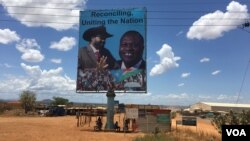The United States, China and other world powers are demanding an end to disputes that have held up the peace process between South Sudan's government and rebel forces.
Ten countries, the European Union and the African Union released an ultimatum Thursday, saying they expect rebel leader Riek Machar to return to the capital, Juba, no later than April 23.
If he does not, they said, they will refer the matter to the United Nations and African Union security councils and request that action be taken.
Machar was due to return to Juba this week to be sworn in as vice president and form a transitional government with his rival, President Salva Kiir; but, expected arrivals on Monday and Tuesday fell through because of last-minute disagreements over the number of troops accompanying Machar and the weapons they would carry.
Machar's return is seen as key to advancing a peace deal the sides signed in August to end South Sudan's two-and-a-half-year civil war, which has displaced more than 2.3 million people.
The countries behind Thursday's statement are partners to JMEC, a body set up to monitor implementation of the peace deal the government and rebels signed in August. They expressed "disappointment" with the government for imposing restrictions on Machar's delegation and "profound disappointment" with Machar for imposing new conditions for his return.
The countries said security conditions in Juba are sufficient for Machar to return, and proposed a final compromise that would allow him to arrive with 195 troops, armed with individuals weapons, 20 machine guns and 20 rocket-propelled grenade launchers.
Rebel negotiator Taban Deng Gai said the rebels, known as the Sudan People's Liberation Movement in Opposition ((SPLM-IO)) approved the compromise.
"If tonight the government brings its approval to allow the bringing in of 20 PKM and 20 RPG, then we can talk about the arrival of the first vice president to Juba at any time," said Gai.
Government spokesman Michael Makuei said he doubted officials would agree.
"We are not expected to accept. This is a mere proposal, and a proposal does not necessarily mean that it must be accepted. The government has not accepted the proposal," said Makuei.
US urges sides to be 'more flexible'
On Wednesday, U.S. Ambassador to South Sudan Cartherine Molly Phee said Washington is disappointed with the leaders of the warring parties in South Sudan. In an interview with VOA's South Sudan in Focus, she urged both sides to honor their pledges and make decisions that advance the peace deal they signed last August.
Ambassador Phee said both parties are to blame for the slow implementation of the peace agreement.
"Both sides need to be more flexible and Dr. Riek needs to recall that the international community met the conditions that he asked for in the JMEC group," she said. She said the rebels' troops and weapons had been transported to Juba and that Machar has no excuse for not coming to the capital.
The U.S. envoy said Washington will not work with South Sudan's government if the two parties are not implementing the peace agreement. She said institutional reforms will remain a prerequisite for assisting the Kiir administration.
"We do not believe it is appropriate to engage in a government that is not inclusive, that fails to make sure that every community in South Sudan, every ethnic community, every political point of view has a seat in the house. Everybody should have a seat and voice in the house and should be able to address differences through a political process rather than at the point of a gun," Phee said.
The U.S. diplomat said South Sudanese leaders should work hard to meet the conditions set by the international community in order to enjoy donor support. She said both President Kiir and Machar need to speed up the formation of the Transitional Government of National Unity and kickstart critical institutional reforms in security sector, governance, economy and reconciliation.
"Those steps are needed for South Sudan to stop this death spiral and to move forward in a positive direction. That is what we all want and that is what we are pushing for," Phee said.







